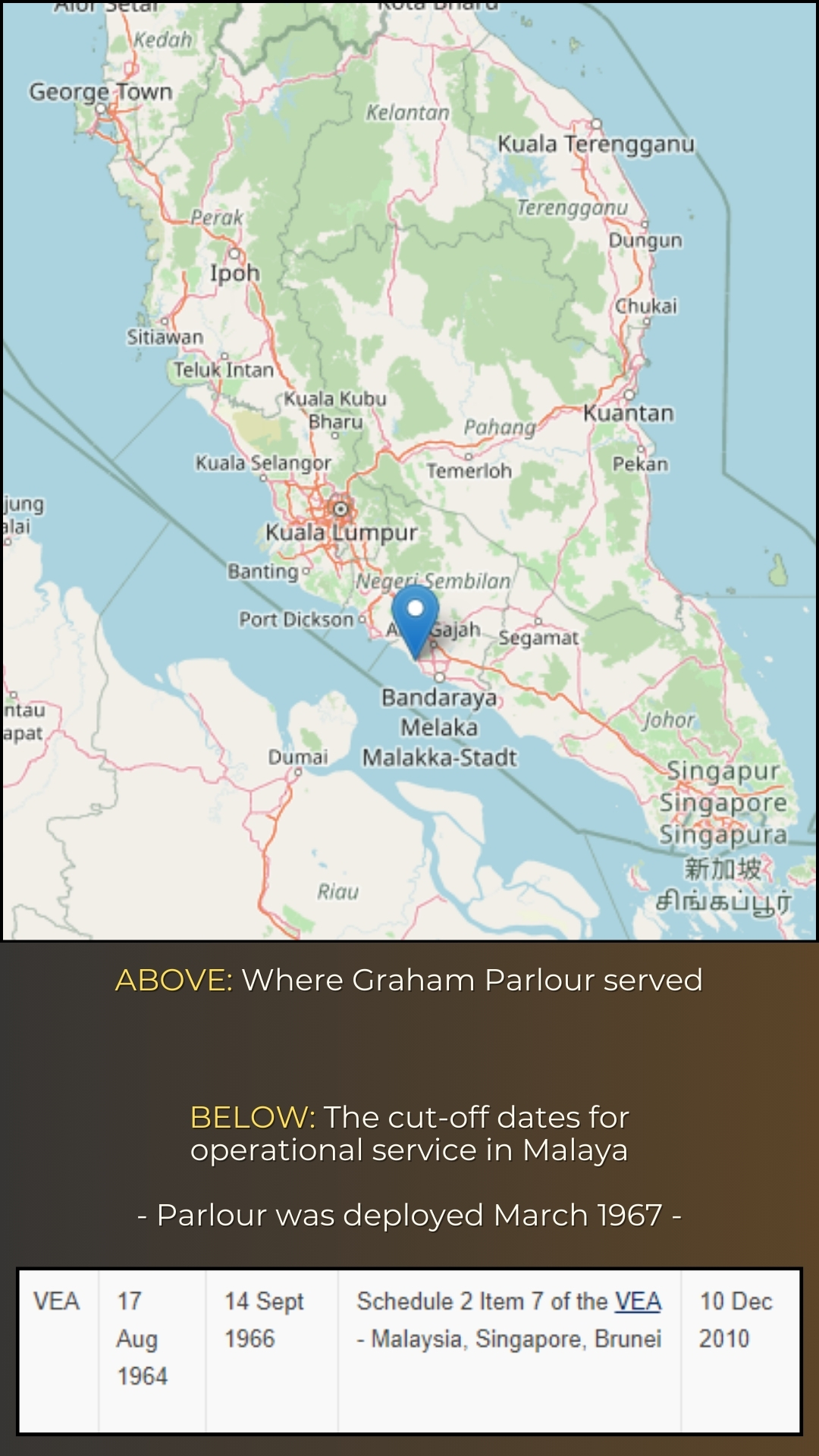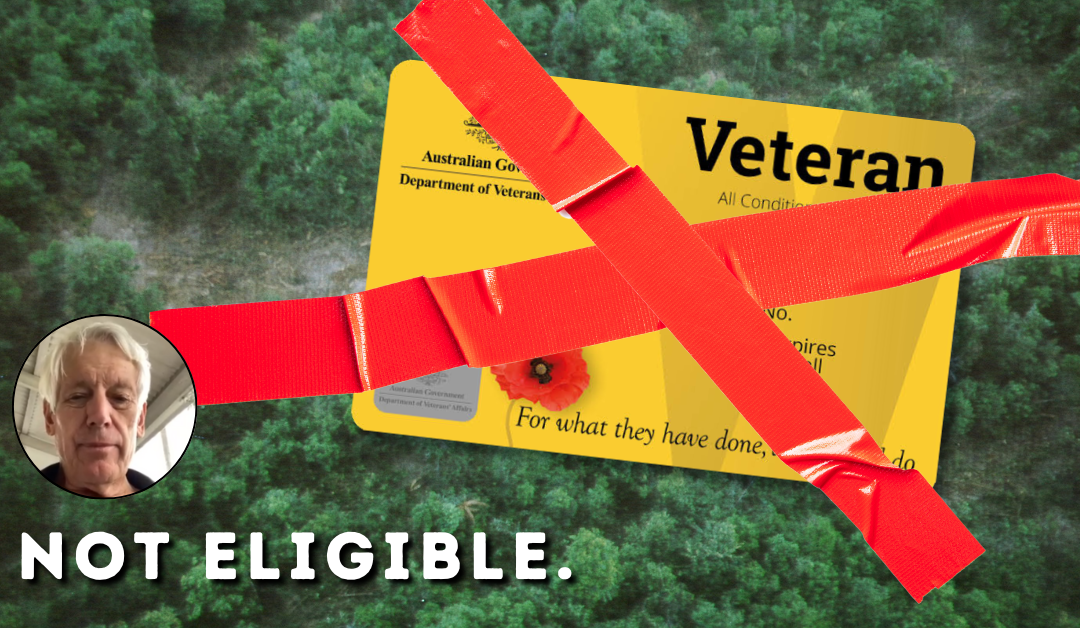A Nasho who almost died in combat has expressed anger at being rejected from the Gold Card because he was not classified as having war-like service.
Brisbane resident Graham Parlour, 79, was almost killed during an attack by communist terrorists while serving at Malaya (present day Malaysia) in the 1960s.
- In short: Nasho Graham Parlour has never been able to get the Gold Card, even though he fought in combat operations in Malaya.
- He missed out on eligibility by 6 months, according to the DVA’s definition of operational service for the region.
- What’s next? Mr Parlour has resigned himself to the possibility that he may never get recognised for the Gold Card.
“I was in artillery, and I was in the radio part of that, where I had a radio on my back, and my job was to call the artillery,” he said.
“We got attacked, and to be honest with you, I thought I was going to die, I thought that was my time.
“I got out of it, thank Christ, and I survived.”
Mr Parlour served there from March 1967 to June 1968 after the Indonesian Confrontation, which ended in 1966.
He was stationed primarily at the Terendak Garrison in North Malacca with ‘A’ Field Battery – the oldest serving unit in the Australian Regular Army.
The defence force continued to recognise deployments to Malaya as operational service until 14 September 1966.
While the Indonesian Confrontation was declared over, Mr Parlour said hostilities continued well beyond that date and that they frequently had to defend themselves while on patrol.
“The government made it very clear to us that there was, well, they use that term guerilla activity, and they were – they were very active,” he said.
“When we lined up before a mission, you were lined up and the Geneva Convention was read to you about the rules of engagement.”
The Department for Veterans’ Affairs defines operational service “as service by a member of the Australian Defence Force in a time of war, or during war-like operations within a defined operational area.”
Why he didn't qualify
Veterans without operational service cannot qualify for the Gold Card unless they can prove 60 permanent impairment points.
Given Mr Parlour arrived in Malaya 6 months after the cut-off date for the operational service declaration, he has been rendered ineligible for the entitlement.
“We were told before we left here that we were covered by everything, but when we arrived there they told us that it was declassified, and that we would not be eligible for this, that and the other thing,” he said.
“We were certainly not offered, were forgotten about, and I felt pretty bad about that because we actually got nothing until the LNP government gave us the White Card only a few years ago.”
Veterans entitlement officer Nicholas Warren, from the Defence and Veterans Legal Service Australia, said many Nashos are impacted by this.
“Now for your fellow, one of the factors that plays is that war-like service gives you access to a higher level of entitlements, but it’s very restricted to specific geographical locations in specific times,” he said.
“If you are 10 miles out of that location or two days late, you simply don’t get that classification of service, and I understand this very much affects a lot of our National Servicemen and people who served in areas that were war-like, but they were there after the war-like declaration finished.”
Mr Warren said the complexity of the legislation gives way to some huge miscarriages of justice.
“The legislation that governs DVA is horrendously complex, so for many veterans, you hear of other veterans in a similar situation to you, and they’ve got this, that or the other, you can’t then assume that same will happen to you,” he said.
“The law is incredibly technical, and it does exclude- there are plenty of cracks that people fall through, and don’t get the same entitlements as other people they served with.
“There are about a dozen different classifications of service type, and that very much dictates what part of the overall entitlements any particular person gets.”
Mr Parkes said while his health is okay at the moment, he is concerned that if something sinister emerged he would not be able to afford it.
“Yes, I know of diggers that have been unlucky enough to get one or two serious problems, and they’ve spent $20-30,000 out of their own pockets,” he said.
“And it’s made their life somewhat unbearable for them because it can be attributed to what happened in their army service.”
These days Mr Parlour still has a tough time dealing with PTSD. He gets triggered easily by loud noises and struggles to be around large crowds.
He puts all his spare time into volunteering with Nasho Fair Go and helping other Nashos overcome their issues.
He said it is incredibly rewarding.
“Well, it’s been great because it reinforced my thoughts that we were left,” he said.
“I found a lot of people had the same thinking and they were excited to at least get some recognition for what we had done during that era.
“I became very enthused about it because I met a lot of people that had lots of problems, and I’ve been able to help some of them, and I felt a lot of gratitude for that— that I was able to help another digger.”
The Men Australia Forgot podcast was launched last year to expose the injustices affecting Nashos, such as Mr Parlour.


